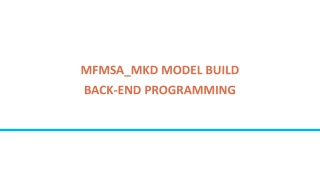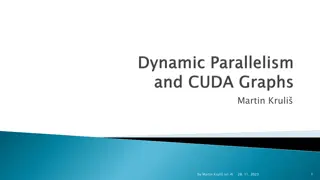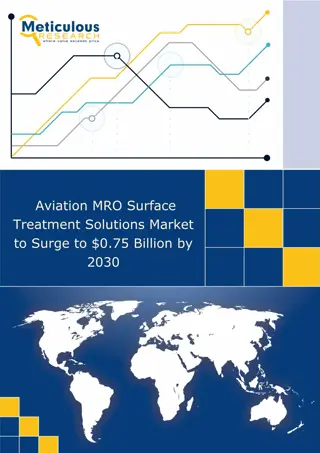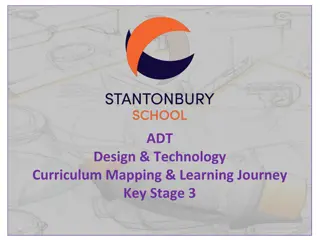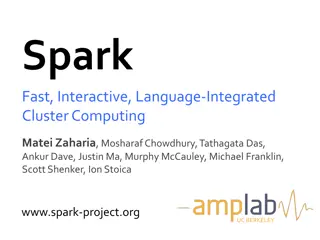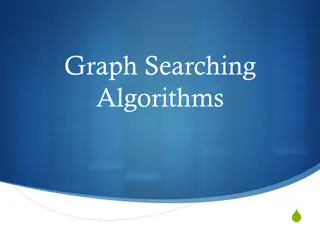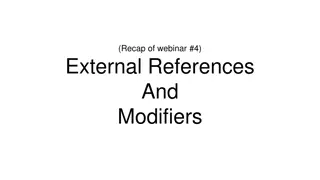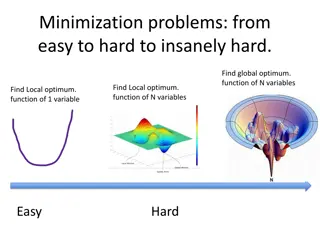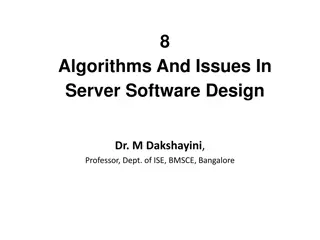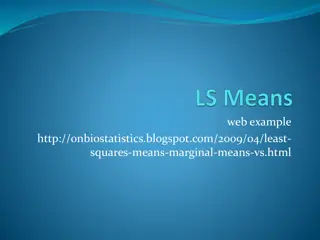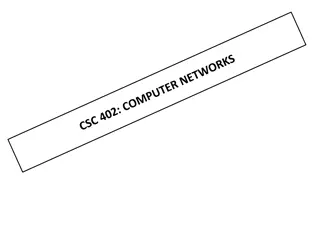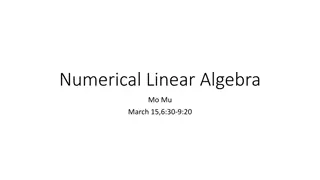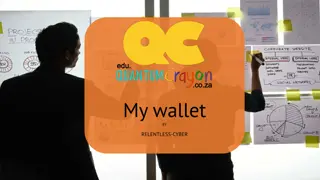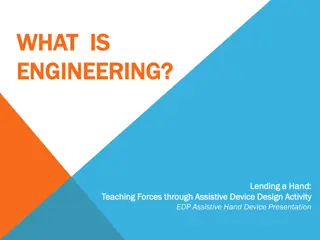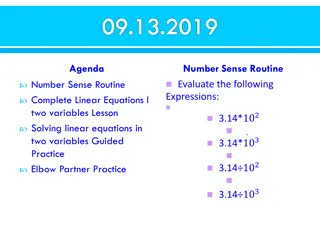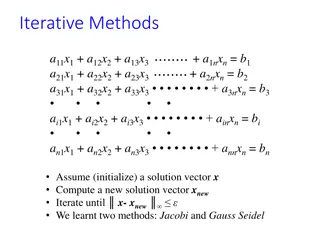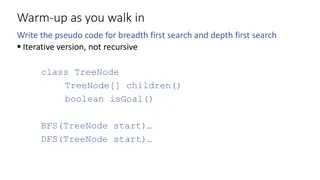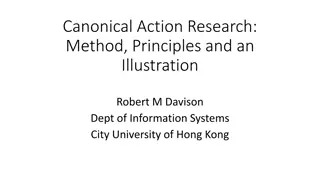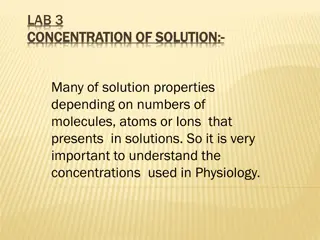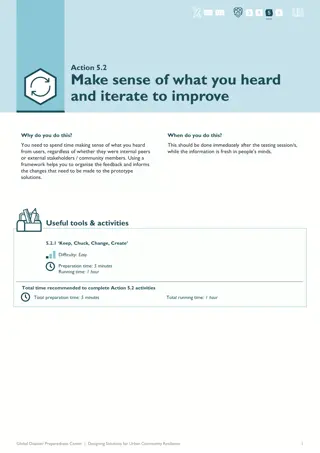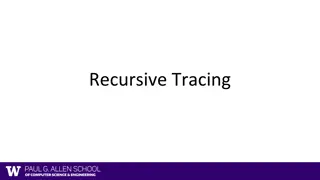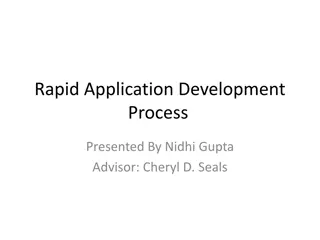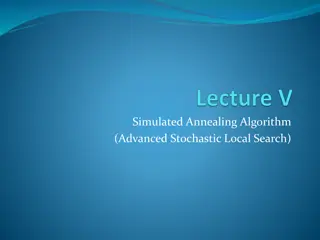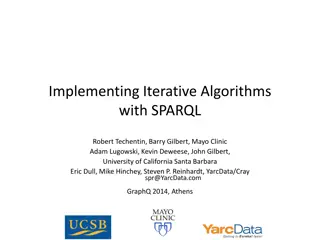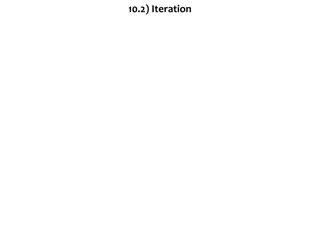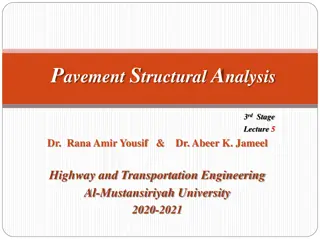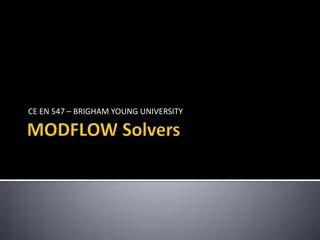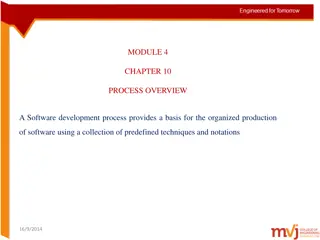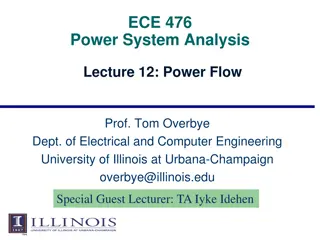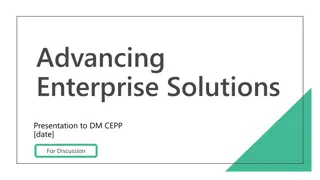Modern End-to-End Programming: Data Preparation, Model Building & Debugging
Prepare, build, debug models covering historical data. Make assumptions, solve equations, ensure data, economic consistency. Iterative processes for accurate simulations.
3 views • 10 slides
GCSE Design Technology Knowledge Organiser and Course Structure Overview
In this detailed knowledge organiser, find information about the GCSE Design Technology course structure, learning objectives, mission statement, and core technical principles for KS4 students. The course emphasizes iterative design cycles, creative thinking, problem-solving, and addressing environm
7 views • 53 slides
Comprehensive IT & Security Solutions for Home and Business Needs
ONE STEP SOLUTION offers a range of IT services including computer sales & services, security solutions, CCTV surveillance systems, networking, fire alarm systems, and more. PROLOGIC SOLUTIONS provides reliable IT and security solutions for industrial and residential requirements, specializing in CC
0 views • 15 slides
Understanding Parallelism in GPU Computing by Martin Kruli
This content delves into different types of parallelism in GPU computing, such as task parallelism and data parallelism, along with discussing unsuitable problems for GPUs and providing solutions like iterative kernel execution and mapping irregular structures to regular grids. The article also touc
1 views • 39 slides
Root Cause Analysis for Campaign Challenges
Root Cause Analysis (RCA) is a problem-solving method used to identify underlying causes of key process challenges in campaigns. It helps in learning from bottlenecks and successes to improve future outcomes. This analysis involves understanding what happened, why it happened, and what actions can b
7 views • 18 slides
Crafting Success How Effective Persona Creation Drives Design Success
Consagous Technologies UI UX Experts has ability to create experiences that resonate with users on a deep and personal level. Effective persona creation is the cornerstone of this success, enabling designers to understand their audience, guide design decisions, foster empathy, and drive iterative im
2 views • 2 slides
Aviation MRO Surface Treatment Solutions Market
Meticulous Research\u00ae\u2014a leading global market research company, published a research report titled, \u2018Aviation MRO Surface Treatment Solutions Market by Surface Treatment (Anodizing Solutions, Chemical Treatment Solutions, Plating Solutions, Coating & Painting Solutions, Non-Destructive
8 views • 3 slides
What is Email Marketing?
Email marketing is a cornerstone of digital marketing, leveraging targeted email communication to engage subscribers and drive desired outcomes. By crafting compelling content, personalized messages, and strategic segmentation, businesses can cultivate meaningful relationships with their audience. B
1 views • 7 slides
Aviation MRO Surface Treatment Solutions Market to Surge to $0.75 Billion by 203
Meticulous Research\u00ae\u2014a leading global market research company, published a research report titled, \n\u2018Aviation MRO Surface Treatment Solutions Market by Surface Treatment (Anodizing Solutions, Chemical\n Treatment Solutions, Plating Solutions, Coating & Painting Solutions, \nNon-Destr
0 views • 3 slides
Design & Technology Learning Journey at Key Stage 3
Explore the ADT Design & Technology Curriculum Mapping and Learning Journey at Key Stage 3, focusing on the iterative design process. Dive into the essential concepts, skills, and experiences that students will encounter in this engaging educational pathway.
0 views • 26 slides
Understanding Apache Spark: Fast, Interactive, Cluster Computing
Apache Spark, developed by Matei Zaharia and team at UC Berkeley, aims to enhance cluster computing by supporting iterative algorithms, interactive data mining, and programmability through integration with Scala. The motivation behind Spark's Resilient Distributed Datasets (RDDs) is to efficiently r
0 views • 41 slides
Understanding Breadth-First Search (BFS) Algorithm for Graph Searching
This content delves into the Breadth-First Search (BFS) algorithm, a fundamental graph searching technique. It explains the step-by-step process of BFS, from initializing the graph to traversing vertices in a specific order. Through detailed visual representations, you will gain insights into how BF
1 views • 75 slides
Understanding External References and Modifiers in Provider Networks
Exploring the intricate details of external references, providers, and negotiated rates within provider networks. Learn about in-network files, iterative development, and the nuances of Medicare plans. Uncover the complexities of provider group IDs, negotiated prices, and in-network locations.
1 views • 28 slides
Binary Logistic Regression with SPSS – A Comprehensive Guide by Karl L. Wuensch
Explore the world of Binary Logistic Regression with SPSS through an instructional document provided by Karl L. Wuensch of East Carolina University. Understand when to use this regression model, its applications in research involving dichotomous variables, and the iterative maximum likelihood proced
0 views • 87 slides
Optimization Techniques for Minimization Problems
Explore various minimization problems, from easy to insanely hard, and learn about finding global and local optima using approaches like bisection, Newton's method, and rationalization. Discover efficient methods such as the golden section and iterative approximation with Newton's method for optimiz
0 views • 17 slides
Issues and Algorithms in Server Software Design
The content discusses fundamental issues in server software design such as connectionless vs. connection-oriented access, stateless vs. stateful applications, and iterative vs. concurrent server implementations. Various server algorithms like iterative and concurrent servers are explained with their
3 views • 44 slides
Understanding Means and LS Means Calculation in Statistics
Explanation of how means and least squares means (LS Means) are calculated in statistics. Describes the process of calculating means for different treatments and centers, as well as deriving LS Means through an iterative process, including handling empty cells.
1 views • 11 slides
Understanding Computer Networks and Servers
Computer networks are groups of connected computers that allow communication and resource sharing. They utilize network media, adapters, operating systems, and protocols. Servers are specialized network computers that provide centralized access to resources like applications, files, and email servic
1 views • 53 slides
Understanding Parenteral Fluid Therapy and IV Solutions
This informative content explores the essentials of parental fluids therapy, including the indications, types of IV solutions (isotonic, hypotonic, hypertonic), and categories of intravenous solutions based on their purpose. It covers the significance of IV solutions containing dextrose or electroly
0 views • 37 slides
Comprehensive Overview of Numerical Linear Algebra Methods for Solving Linear Systems
Explore numerical linear algebra techniques for solving linear systems of equations, including direct and iterative methods. Delve into topics like Gaussian elimination, LU factorization, band solvers, sparse solvers, iterative techniques, and more. Gain insights into basic iterative methods, error
6 views • 12 slides
Designing the Perfect Wallet for Mom
Explore the design process of creating an ideal wallet for a partner, focusing on portability and security. Empathize with their needs, define the problem, ideate creative solutions, and gather feedback for iterative improvements. The goal is to address the partner's preferences for a small, durable
0 views • 8 slides
Robust Parity Test for Extracting Parallel Vectors in 3D
Fundamental primitives for visualizing 3D data include line features like ridges and valleys of a scalar field, stream lines of a vector field, vortices of a velocity field, and extremal curves of a tensor field. Parallel Vectors (PV) provide a unified representation of 3D line features, forming con
0 views • 27 slides
Understanding Engineering: Concepts and Processes
Engineering is the application of science, math, and technology to design solutions for everyday problems, benefiting society. The Engineering Design Process (EDP) involves defining problems, researching, brainstorming solutions, building prototypes, testing, communicating designs, and redesigning a
0 views • 28 slides
Understanding Linear Equations in Two Variables
Explore linear equations in two variables, solving systems of equations, graphing solutions, and determining types of solutions. Learn how to analyze and find solutions graphically, identify infinite solutions, no solutions, and unique solutions, and understand the concept of dependent systems. Disc
0 views • 35 slides
Understanding Iterative Methods in Linear Algebra
Explore the concepts of iterative methods such as Jacobi and Gauss-Seidel for solving systems of linear equations iteratively. Understand conditions for convergence, rate of convergence, and ways to improve convergence speed. Delve into iterative schemes in matrix forms, convergence criteria, eigenv
0 views • 39 slides
AI Search Algorithms: BFS and DFS Pseudo-code Iterative Version
Explore the iterative versions of Breadth First Search (BFS) and Depth First Search (DFS) with pseudo-code examples implemented for class TreeNode. Understand the concept of TreeNode, children() function, isGoal() method, and apply BFS and DFS starting from TreeNode start.
0 views • 53 slides
Understanding Canonical Action Research: Method, Principles, and Practice
Canonical Action Research involves researcher intervention to address organizational problems, contributing to both academic theory and practical solutions. It emphasizes the importance of engaging with interpretivist epistemology, iterative and rigorous processes, and collaborative efforts between
0 views • 59 slides
Understanding Concentration of Solutions in Physiology
Concentration of solutions is crucial in understanding the properties of substances in Physiology. This involves concepts like percentage solutions and molar solutions, where the amount of solute is measured in grams or moles relative to the volume of the solution. Percentage solutions are commonly
0 views • 8 slides
Iterative Feedback Framework for Prototype Improvement
The iterative feedback framework involves making sense of user feedback using the Keep, Chuck, Change, Create (KCCC) model to iterate and enhance prototype solutions. This process helps organize input from testing sessions, informing necessary modifications for better outcomes. The framework emphasi
1 views • 26 slides
Understanding Recursive and Iterative Factorials through Tracing
This content provides an in-depth exploration of recursive and iterative factorial functions through tracing examples. The explanations are accompanied by visual aids to help conceptualize the iterative and recursive processes of calculating factorials. By comparing the two methods side by side, rea
0 views • 7 slides
Understanding Rapid Application Development (RAD) Process
Rapid Application Development (RAD) is a software development process that focuses on minimizing pre-planning and accelerating the software development lifecycle. By involving users early on, utilizing prototyping, and emphasizing user requirements, RAD aims to deliver high-quality systems quickly.
0 views • 63 slides
Understanding Simulated Annealing Algorithm: A Stochastic Local Search Approach
Simulated Annealing Algorithm is a powerful optimization technique that helps prevent getting stuck in local minima during iterative improvement. By accepting uphill moves, changing neighborhood structures, and modifying objective functions strategically, simulated annealing allows exploring a broad
0 views • 34 slides
Implementing Iterative Algorithms with SPARQL
This comprehensive guide explores the implementation of iterative algorithms with SPARQL, focusing on YarcData/Cray's approach to using these algorithms. It covers YarcData's interest in graphs, the Urika appliance, iterative algorithms in machine learning, implementation approach, and algorithms im
1 views • 12 slides
Iterative Root Approximation Using Natural Logarithm
The content covers iterative root approximation using natural logarithm in solving equations. It explores finding roots by iterative formulas and demonstrates calculations to reach approximate values. The process involves selecting intervals to show correct values and ensuring continuity for accurat
0 views • 14 slides
Nonlinear Analysis of Pavement Structural Stresses and Deflections
Explore the effect of nonlinearity in granular materials on vertical stresses and deflections in pavement structural analysis. Learn about iterative methods and stress invariants to understand pavement behavior under traffic loads. Discover the application of Boussinesq's solutions and Burmister's l
0 views • 20 slides
Understanding Iterative Solvers in MODFLOW
In this content, you will learn about the working of iterative solvers, solver parameters, troubleshooting convergence issues, and various solver algorithms in MODFLOW. The iterative tweaking of starting head values, different solver codes like SIP, PCG2, GMG, and their characteristics are explained
0 views • 21 slides
Understanding Mixtures: Types and Examples
A mixture is a combination of different ingredients that can be separated. There are various types of mixtures such as liquid solutions, solid solutions, and gas solutions. Liquid solutions involve solid substances dissolved in a liquid, like sugar in water, while solid solutions include metal alloy
0 views • 15 slides
Software Development Process Overview
A software development process provides a structured approach for creating software using predefined techniques and stages such as system conception, analysis, system design, class design, implementation, testing, training, deployment, and maintenance. It involves stages like domain analysis, applic
0 views • 39 slides
Power System Analysis: Lecture on Power Flow
Lecture 12 on Power Flow Analysis in Power Systems covers the use of power balance equations when analyzing complex power consumption and generation. It explains the derivation of real power balance equations for iterative solutions in power flow analysis. The lecture highlights the need for iterati
0 views • 30 slides
Advancing Enterprise Solutions Presentation for Discussion
This presentation focuses on advancing enterprise solutions within the Government of Canada, particularly in the context of whole-of-government approaches and digital transformation. It discusses the importance of a holistic enterprise approach, governance solutions, and how enterprise is addressed
0 views • 17 slides
